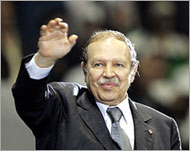Algerians back civil war amnesty
Algerians have voted overwhelmingly to turn the page on a decade of brutal civil war by offering a partial amnesty to hundreds of Islamic rebels.

The conflict, which has cost more than 150,000 lives, pitted neighbour against neighbour and isolated the oil-producing Arab state from the rest of the world amid atrocities by rebels and allegations of crimes by security forces.
Interior Minister Noureddine Zerhouni said on Friday that results indicated 97.4% of Algerian voters backed Thursday’s referendum on a “charter for peace and national reconciliation”, which saw a participation level of 80% of 18.3 million eligible voters.
“The time has come to turn the page on hate and violence. As Muslims we have to unify and believe that the future is going to be better than the past,” 45-year-old shop owner Mohamed Lamri said on the outskirts of the capital, Algiers.
Human rights groups and some families of victims of the conflict fear the security forces, accused of being behind thousands of disappearances, will never stand trial now.
Rebels denounce vote
An internet statement attributed to Algeria’s largest outlawed militant group, aligned with al-Qaida, said it opposed the amnesty and would continue its “jihad”.
 |
|
Bouteflika is accused of using the |
“This vote is a waste of time. Algeria is not in need of a charter for peace and national reconciliation, but in need of a charter for Islam,” said the statement on an Islamist website, dated 27 September and attributed to the leader of the Salafist Group for Preaching and Combat (GSPC).
The statement’s authenticity could not be verified.
“The jihad will go on … we have promised God to continue the jihad and the combat,” said Abou Mossab Abdelouadoud, whose real name is Abdelmalek Droukdel.
Controversial charter
The controversial charter praised the powerful army and state agents in their fight against rebels seeking to turn the North African country into an Islamic state.
It also blamed the rebels for what it called a “national tragedy”.
Some opposition parties accuse President Abdelaziz Bouteflika of planning to use the vaguely worded charter to push through laws to strengthen his grip on the oil-producing state.
“It’s a plebiscite organised by the regime to realise the ambitions of Bouteflika and extend his power,” Hocine Ait Ahmed, exiled leader of the opposition Socialist Forces Front, told Swiss daily Tribune de Geneve. “The results will be fraudulent.”
The conflict began after the army cancelled the second round of Algeria‘s first multi-party legislative election, which the Islamic Salvation Front (FIS) was on course to win in 1992.
Election boycott
Thursday’s voting was marred by violence in several provinces in the east of the country, particularly in the Berber region of Kabylie, where opposition parties had called for a boycott.
|
“The vote was done in total transparency” |
Participation in the main Berber city of Tizi Ouzou was 11.5%.
In provinces hardest hit by 13 years of civil war, participation exceeded 90%.
“The vote was done in total transparency,” Zerhouni said.
However, there were no independent organisations monitoring the ballot, and analysts questioned the stated high level of participation, given that many polling stations were half-empty.
Bloody past
Most Algerians said they were ready to forgive, although the cruelty witnessed is still poorly understood. Rebels were accused of going from village to village at night, beheading families.
 |
|
Rebels involved in massacres are |
Rights groups and some of the opposition say Algeria should not put the bloody past behind, but seek accountability and truth, or else the nightmare will not fade away.
Souad Zafar, who survived a massacre in Bentalha near Algiers in 1997, said she backed the referendum for her son to have a future, but would not forgive the rebels whom she watched kill seven members of her family.
The charter will pardon hundreds of rebels in prison, on the run or still fighting, and drop other legal proceedings. Those involved in massacres are excluded, but critics say a patchy judicial system will mean some culprits will escape justice.
Rebels still active
About 1000 militants, most belonging to the GSPC, remain active and carry out sporadic attacks, mostly against soldiers.
Leading former militant chief Madani Mezrag, who was amnestied in the late 1990s, said that 80% of rebels would come down from the mountains, but that the struggle for an Islamic state would continue through democratic means.
The charter bans top Islamists from politics, a move analysts said was to ensure the powerful army did not object.
Referendum success
Abdallah Djaballah, the leader of the largest opposition and Islamic party, said the referendum was a success, but said it also placed great pressure on the authorities to fulfil promises.
|
“Our country has a lot of money but the government is not doing enough to solve the social and economic problems, which are still a source of unrest” |
“The officials have to be fully aware of this and they also have to do their utmost and draw up precise, clear and unambiguous laws which embody the spirit of the charter,” Djaballah told state radio.
“The referendum will not end the Algerian crisis. Our country has a lot of money but the government is not doing enough to solve the social and economic problems, which are still a source of unrest,” said Yousef Bakir, a state employee.
The United States said that while it would have preferred a more comprehensive public debate about accountability, it would respect the result of a referendum, which it called critical to healing the wounds of the conflict.